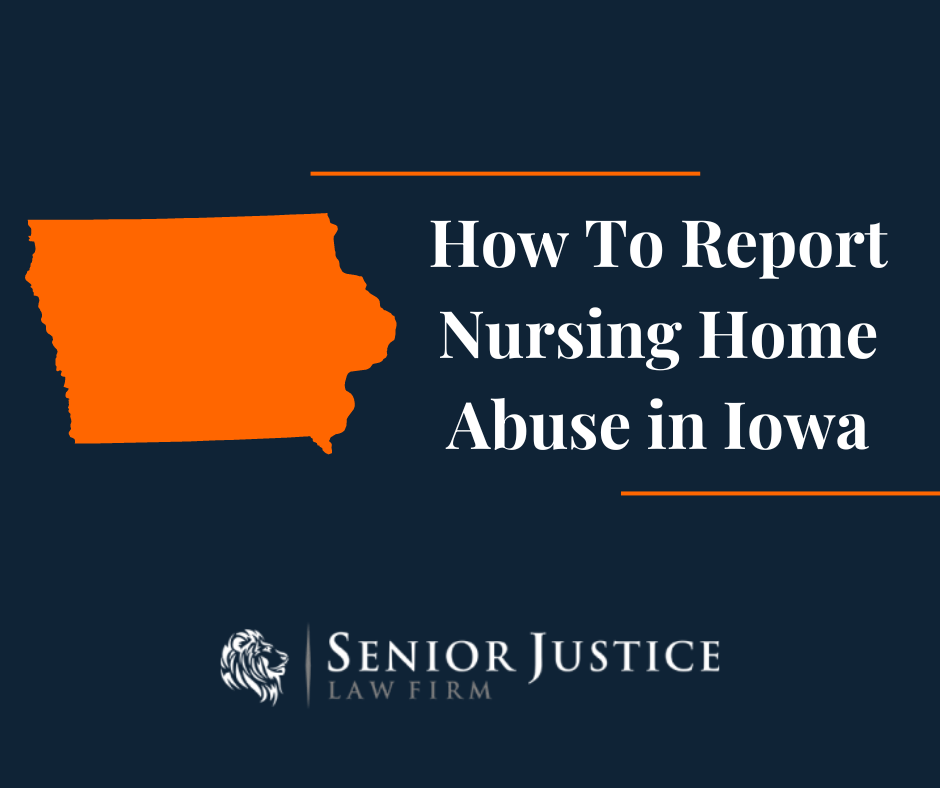Unfortunately, not every nursing home operates with the best interests of patients in mind. An ideal long-term care facility would ensure that hygienic, medical, emotional, and financial needs are well managed. When your loved one’s needs are no longer being met, this may be a sign of elder abuse. The first step in helping protect your loved one and other residents from abuse is to report any negligence you discover. For help with trying to report nursing home abuse in Iowa, contact Senior Justice Law Firm today.
Reporting Nursing Home Abuse In Iowa

Several types of abuse may need to be reported, including:
- Sexual abuse,
- Physical abuse, or
- Financial abuse.
If you believe your loved one has been abused at their care facility, you need to report the abuse to the facility’s administrator and director of nursing. You must also file a report with the Iowa Department of Inspections and Appeals (IDIA). If you fear that your loved one will face retaliation if you report the abuse, you can choose to move your loved one to a new facility before making the report.
The law bars care facilities from retaliating against your loved one for any abuse or negligence reports filed. But you might be concerned that the law may not be enough to stop retaliation and its negative impact on your loved one. That is why you might consider moving your loved one before reporting. However, suppose you leave your loved one in the facility, and you see that the facility is retaliating. In that case, you can seek to hold them accountable for violating the aforementioned anti-retaliation law.
Sexual Abuse
Your loved one has suffered sexual abuse if they submit to, engage in, or perform a sexual act as a result of force, fear, threat, or deception. Sexual abuse also includes any nonconsensual sexual act.
Physical Abuse
Physical abuse is defined as an intentional bodily injury. Examples of physical abuse include slapping, pinching, kicking, shoving, or choking. It also consists of the unnecessary use of restraints and improperly administering drugs.
Financial Abuse
Financial abuse is more subtle than the various kinds of physical abuse. It can take the form of sudden changes in billing practices or more frequent errors, duplicate bills, unexplained charges, and a lack of transparency in billing practices. Billing is not the only form of financial abuse. If staff members gain access to bank accounts or credit cards, there can also be unauthorized withdrawals or purchases.
Reporting Nursing Home Negligence
You should always report nursing home negligence. Negligence requires four elements you must prove. These four elements are:
- Duty. The nursing home has a duty of care to its patients. At a minimum, they have a duty to appropriately care for patients, provide for their basic needs, and ensure that they are safe.
- Breach. The nursing home needs to meet a reasonable standard of care and fails to do so.
- Causation. The breach of duty caused an injury.
- Damages. The victim suffered financial or other losses due to the breach. These losses can include things like medical costs and pain and suffering.
There is some overlap between physical abuse and negligence. However, negligence can include things like malnutrition, dehydration, or improper skin care. Negligence can also be the failure to provide necessary care. For example, the nursing home has a duty to prevent falls. If your loved one continues falling, you likely have a negligence claim. If you believe your loved one is being neglected at their care facility, you need to report the neglect to the facility administrator, director of nursing, and the IDIA.
Reporting Elder Abuse In Iowa
Elder abuse encompasses sexual abuse, physical abuse, financial abuse, and neglect. However, it also includes emotional abuse, deprivation of care, or isolation. Emotional abuse can often go unnoticed because of the lack of physical marks.
A common sign of emotional abuse is a behavior change. If you see your loved one becoming withdrawn, anxious, or depressed without medical explanation, it can be a sign of emotional abuse. If your loved one has a caretaker who belittles, ignores, or threatens them, they are likely a victim of emotional abuse, and they might start showing some of these symptoms. If you suspect it is happening, you should report elder abuse by contacting Dependent Adult Protective Services (APS).
Contact Senior Justice Law Firm for Help with Your Abuse Claim
At Senior Justice Law Firm, we’ve concentrated our practice on holding assisted living facilities, nursing homes, and hospitals accountable for patient neglect. We only represent victims and their families and have helped thousands receive justice for injury, neglect, abuse, and wrongful death inside their long-term care facility. Since our mission is to help protect seniors from negligent caretakers, let our singular focus and vast experience assist you with your claim. Contact Senior Justice Law Firm for your free consultation today.

